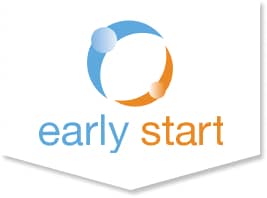In this blog we are going to focus on Vitamin D recommendations for infants and toddlers as it can be difficult for them to get enough in their diet.
Vitamin D Recommendations for the Under 4’s
The Department of Health and Social Care recommends the following:
Breastfed babies from birth to one year of age:
- should be given a daily supplement containing 8.5 to 10mcg of vitamin D, to make sure they get enough (as a precautionary measure).
- the same advice should be followed for mixed-fed infants (those part breast-fed and part formula fed (less than 500mls/day)) and whether or not their mother is taking a supplement containing vitamin D herself.

Babies Fed Infant Formula:
- should not be given a vitamin D supplement until they are receiving less than 500ml/17oz (about a pint) of infant formula a day, because infant formula is fortified with vitamin D.
- Parents can speak to their GP, Pharmacist or HV to discuss their child’s requirements.
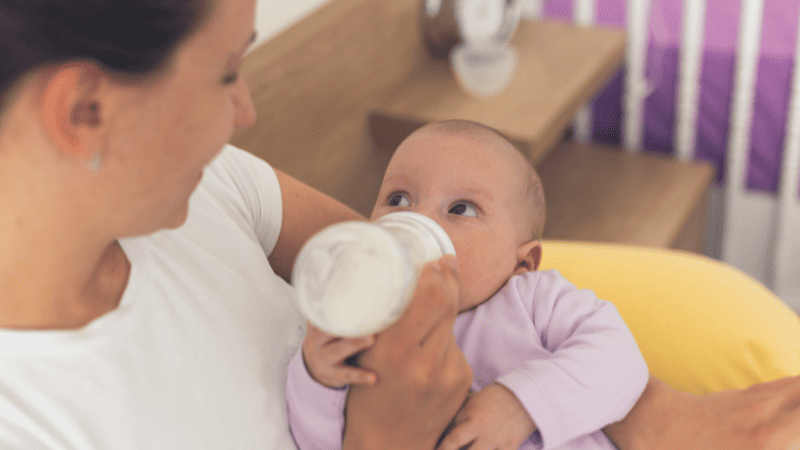
All children aged 1 to 4 years old:
- should be given a daily supplement containing 10mcg of vitamin D.

About Vitamin D
Vitamin D is found in some foods and amazingly the body can make it when our skin is exposed to sunlight. However, in the UK there are many factors that impact on our vitamin D levels, which means we have guidance from Public Health England on taking a vitamin D supplement.
Why is vitamin D important?
We need vitamin D to help the body absorb calcium and phosphate from our diet as these minerals are important for healthy bones, teeth, and muscles. A lack of vitamin D, known as vitamin D deficiency, can cause bones to become soft and weak, which can lead to bone deformities, muscle weakness, and falls.
A lack of Vitamin D or calcium can lead to:
- rickets in children
- osteomalacia in adults, which causes bone pain and tenderness.

Sources of Vitamin D
In the UK, we get most of our vitamin D from sunlight exposure from around late March/early April to the end of September. At this time of year, most people can make enough vitamin D from being out in the sun daily for short periods with their forearms, hands or lower legs uncovered and without sunscreen.
It’s not known exactly how much time is needed in the sun to make enough vitamin D to meet the body’s requirements. This is because there are a number of factors that can affect how vitamin D is made, such as:
- skin colour or how much skin you have exposed
- children under 6 months of age should be kept out of direct strong sunlight
- children and young people need their skin protecting between March and October in the UK by covering up with suitable clothing, spending time in the shade (particularly between 11 am to 3.00 pm) and wearing sunscreen (at sun protection factor (SPF) of at least 30, at least 4-star UVA protection).

Vitamin D in Food
Most people get little vitamin D from their diet as only a few foods naturally contain the vitamin.
Foods naturally-rich in vitamin D include:
- egg yolk
- oily fish such as salmon, mackerel, herring and sardines
- meat, fat, liver* and kidney
- Infant formulas and toddlers milk have added vitamin D however, it is not advised that parents rely on toddler milks for their child to receive vitamin D and they should speak to their HV firstly.
*Liver is unsuitable for infants under six months and should be limited to once per week when children are over six months of age.

Vitamin D supplement recommendations
As it can be difficult to get enough vitamin D from the sunlight and from our diet the Department of Health and Social Care has issued vitamin D recommendations to help us to meet our daily requirements, as discussed above.
When choosing supplements speak to you pharmacist who will be able to advise you on choosing that meets your families requirements.
Usage:
Always follow manufactures instructions and keep to the dose recommended on the label, and be careful not to give your child 2 supplements at the same time.
- Do not add to food or drink that will be heated as this can destroy the vitamins
- Follow guidance in relation to use by dates as the vitamin content will vary as a result
- The drops are preferential to the vitamin syrups or chewable tablets (which may contain added sugar).
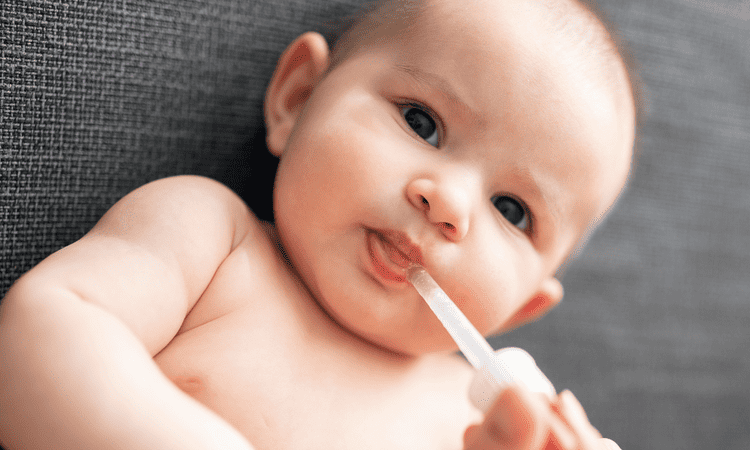
Vitamin D via the NHS Healthy Start Scheme
NHS Healthy Start is a UK-wide government scheme which aims to improve the health of pregnant women and young families on benefits or low incomes. Beneficiaries receive help to buy liquid cow’s milk, plain fresh or frozen fruit and vegetables, and infant formula milk.
Families are also able access free Healthy Start vitamins (for pregnant women, new mums and children).
Women more than 10 weeks’ pregnant, and families with children under four years old, qualify for Healthy Start if the family is receiving:
- Income Support, or
- Income-based Jobseeker’s Allowance, or
- Pension Credit (which includes the child addition)
- Child Tax Credit (with a family income of £16,190 or less per year)
- Universal Credit (with a family take home pay of £408 or less per month).
The following are also eligible for Healthy Start:
- All pregnant women under 18 years, even if they don’t get any of the above benefits
- Pregnant women (over 10 weeks pregnant) who claim income-related Employment and Support Allowance (ESA)
- Families who get Working Tax Credit run-on only. (Working Tax Credit run-on is the Working Tax Credit you receive in the 4 weeks immediately after you have stopped working for 16 hours or more per week).
There will be many families in your setting meeting the eligibility criteria who will qualify for the Healthy Start scheme (particularly families entitled to free childcare for their 2 year old)!
Please Note: Claiming doesn’t affect families other financial benefits
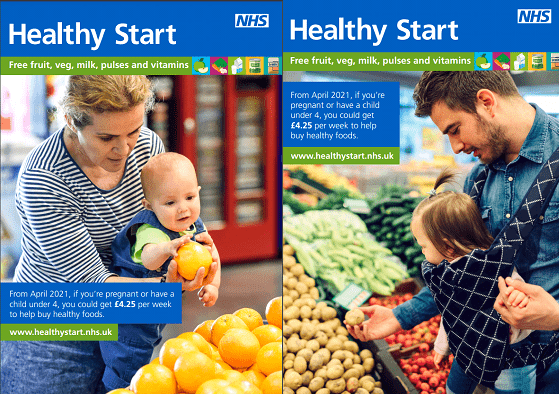
Healthy Start can help families with their weekly food shop by adding nutritious foods to their basket! Healthy Start also contributes to families weekly budgets. Families will receive:
Food and Drink
They will get:
- £4.25 each week of your pregnancy (from the 10th week of your pregnancy)
- £8.50 each week for children from birth to 1 year old
- £4.25 each week for children between 1 and 4 years old.
which they can use in local shops to buy (they must display a Mastercard symbol):
-
- plain cow’s milk – whole, semi-skimmed or skimmed. It can be pasteurised, sterilised, long life or UHT
- fruit and vegetable– plain fresh, frozen or tinned (fruit and vegetables with no added ingredients), whole or chopped, packaged or loose
- pulses – fresh, dried, tinned pulses
- infant formula milk that is based on cow’s milk and can be used from birth (stage one).
Healthy Start Vitamins
Families can also their your card to get free vitamin supplements. These are tablets for women and drops for children. Pregnant women, women with a baby under one year old and children aged up to their fourth birth will receive Healthy Start vitamins.
- Healthy Start women’s vitamin tablets contain Folic acid, vitamin C, vitamin D.
- Healthy Start children’s vitamin drops contain vitamin A, vitamin C and vitamin D.
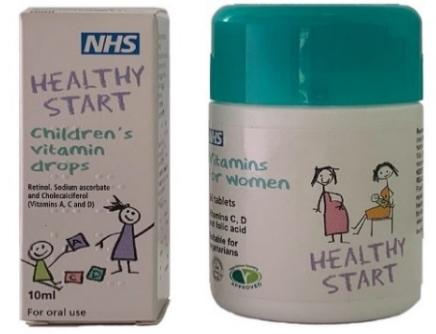
Note:
Healthy Start vitamins are suitable for are suitable for vegetarians and halal diets. They are free from milk, egg, gluten, soya and peanut residues. They’re not suitable for vegans. Families should also be advised to check the labels for any allergy requirements.
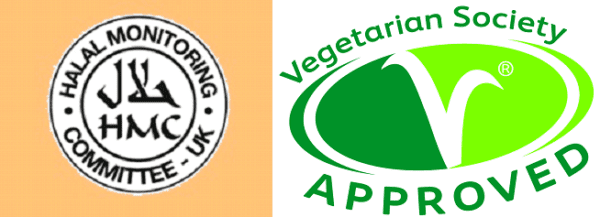
Access to food and vitamin vouchers will support families to eat more fruits and vegetables and to meet the recommendations for Vitamin D. You can visit the Healthy Start website (opens in new tab) to check you qualify by answering a few short questions.
Early years staff who would like to support families to meet their vitamin D requirements and increase the uptake of Healthy Start should book our training module ‘Vitamin D – a healthy start (opens in new tab)‘ for up to date evidence based advice.
Universal Free Healthy Start Vitamins
In some areas, Healthy Start vitamins are free to all families – contact local health visiting teams to find out if they’re free where you live. For example the London Borough of Newham provides free universal vitamins.
London Borough of Newham Universal Free Healthy Start Vitamin Scheme?
All families with children under the age of 4, pregnant and breastfeeding mums in Newham are entitled to the free vitamins.
Who are the distributing partners in Newham?
- Childrens Health 0-19 Service
- Maternity Service
- Childrens Centres.
You can find details for Newham’s Children’s Centres here! (opens in new tab)
Families who have not yet registered for the Healthy Start Scheme that may be eligible for free Milk and Food vouchers/ payments, please continue to promote this and direct families to the Healthy Start website (opens in new tab) or if available provide them with an application form (A professional no longer requires to sign the form).
